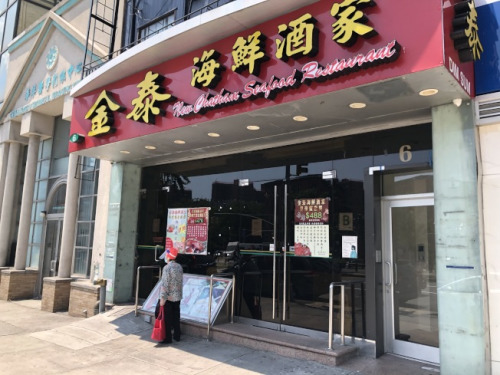China News Service, July 7th, according to the US "World Daily" report, New York City entered the third stage of resumption of work on July 6, but the restaurant is still not open for dine-in; although restaurants can apply for outdoor dining seats, but for larger venues, For Chinese restaurants that are more expensive to rent and hold banquets as the main source of income, returning customers can be regarded as a lot of money. Many Chinese restaurants in Manhattan Chinatown will be closed forever. Those who are still struggling to support the restaurant believe that the restaurant's business should improve. "Don't think about it this year."
It is understood that the "Yongtai Seafood Restaurant" and "Jintai Seafood Restaurant" located in East Broadway and Lin Shiguo have been determined to be permanently closed; another well-known restaurant, "Kirin Golden Pavilion", is expected to start takeout service next week.
Jintai Seafood Restaurant has confirmed that it will be closed forever. (US "World Daily"/Photo by Yan Jiaying)
However, many restaurant operators also said that even if the city government resumes dine-in meals on the 6th according to the original plan, it is still not ready to meet the return of a large number of customers; Liao Kaiqi, sales manager of Jinfeng Restaurant, said that Jinfeng restaurant is very large and has no The windows and the air circulation rate are not very good, and many people in the community who will eat at the restaurant are old people, and the employees are mostly older generation immigrants. They start eating in a hurry, fearing that the risk is not small.
Jinfeng is located on Elizabeth Street. The street is more spacious. In addition to providing takeaway, tables and chairs are also set up on the bowl noodle street to build a shed so that people can eat under the shed. But on the Mott St. The "restaurant" is limited by the venue, and it is not possible to place tables on the street for outdoor dining; the Rongxin Restaurant on East Broadway closes the banquet venues on the first and second floors, provides takeaways in the basement of the restaurant, and sells frozen chickens and ducks.
Chen Ziqiang, chairman of Donglai Restaurant, said that the restaurant has been back to work for two months and provides take-out services. Although the business is good and the customers are endless, it is still impossible to subsidize the rent and manpower expenses by taking-out income.
Chen Ziqiang said that the restaurant has a large venue and expensive rent. Unlike ordinary restaurants, it mainly relies on holding banquets and parties as the main income. Once the banquets and parties are gone, the piecemeal takeaway orders can not offset the cost. It is simply not enough.
He said that taking the restaurant as an example, the monthly rent would be nearly 50,000 US dollars, and the hourly wages of employees are also expensive. He and his partners work 12 hours a day and 7 days a week, and they are still unable to turn a profit.
In addition to the venue and labor costs, Chen Ziqiang said that after the epidemic, the price of vegetables also increased, but fear of customer loss, small profits and quick sales, most businesses still dare not increase prices; Donglai Restaurant currently sells a snack for three yuan and lunch for eight Yuan, Chen Ziqiang said that in order to reflect the cost when he first resumed work, he once raised the meal price by 5 cents, but finally adjusted the price back.
From May to October in the past to the end of the year, it was the time when banquets and parties were held the most, and the restaurant business was hottest. Many restaurants rely on the months at the end of the year to earn their main income for the whole year. In recent years, due to changes in the immigration structure, There are many people going to Flushing and Brooklyn. No matter how big or small the Chinatown restaurant is, there is a decrease in the number of people. This year, there is an epidemic again. Chen Ziqiang said that even if the epidemic improves, there will not be a return of party orders at the end of the year.
Chen Ziqiang said that many businesses are now relying on government loan subsidies to barely support them. If there is no loan subsidy, more businesses will be forced to close their doors, including Chinese restaurants, and there will be more People are unemployed.
Regarding the future of the Chinese restaurant, Chen Ziqiang said that he "dare not think about it and don't have to think about it". He can only do one step at a time like other companies, and he expects the epidemic to improve as soon as possible. (Yan Jiaying)

